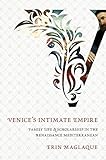Venice's Intimate Empire : Family Life and Scholarship in the Renaissance Mediterranean / Erin Maglaque.
Material type: TextPublisher: Ithaca, NY : Cornell University Press, [2018]Copyright date: ©2018Description: 1 online resource (240 p.) : 5 b&w halftones, 2 line drawings, 1 mapContent type:
TextPublisher: Ithaca, NY : Cornell University Press, [2018]Copyright date: ©2018Description: 1 online resource (240 p.) : 5 b&w halftones, 2 line drawings, 1 mapContent type: - 9781501721663
- Families -- Italy -- Venice -- History -- 16th century
- Family life -- Italy -- Venice -- History -- 16th century
- Humanism -- Italy -- Venice -- History -- 16th century
- History
- Medieval & Renaissance Studies
- West European History
- HISTORY / Renaissance
- family, humanism, humanist education, empire, imperial families, Venetian Mediterranean empire
- 945.3070922 23
- DG678.235 .M34 2018
- DG678.235 .M34 2019
- online - DeGruyter
| Item type | Current library | Call number | URL | Status | Notes | Barcode | |
|---|---|---|---|---|---|---|---|
 eBook
eBook
|
Biblioteca "Angelicum" Pont. Univ. S.Tommaso d'Aquino Nuvola online | online - DeGruyter (Browse shelf(Opens below)) | Online access | Not for loan (Accesso limitato) | Accesso per gli utenti autorizzati / Access for authorized users | (dgr)9781501721663 |
Frontmatter -- Contents -- List of Illustrations -- Acknowledgments -- Introduction -- 1. Venetian Families: From the Household to the Scuola -- 2. Documenting the Mediterranean World -- 3. Gender and Identity between Venice and the Mediterranean -- 4. Becoming Istrian -- 5. Colonial Governance and Mythology on Skiathos -- 6. On the Borders of Italy -- Conclusion -- Appendix I. Giovanni Bembo describes Cyurω’s final illness and death, and the death of his daughter Angela -- Appendix II. Giovanni Bembo describes how the rumor of his scandal on Skiathos spread -- Notes -- Bibliography -- Index
restricted access online access with authorization star
http://purl.org/coar/access_right/c_16ec
Mining private writings and humanist texts, Erin Maglaque explores the lives and careers of two Venetian noblemen, Giovanni Bembo and Pietro Coppo, who were appointed as colonial administrators and governors. In Venice’s Intimate Empire, she uses these two men and their families to showcase the relationship between humanism, empire, and family in the Venetian Mediterranean.Maglaque elaborates an intellectual history of Venice’s Mediterranean empire by examining how Venetian humanist education related to the task of governing. Taking that relationship as her cue, Maglaque unearths an intimate view of the emotions and subjectivities of imperial governors. In their writings, it was the affective relationships between husbands and wives, parents and children, humanist teachers and their students that were the crucible for self-definition and political decision making. Venice’s Intimate Empire thus illuminates the experience of imperial governance by drawing connections between humanist education and family affairs. From marriage and reproduction to childhood and adolescence, we see how intimate life was central to the Bembo and Coppo families’ experience of empire. Maglaque skillfully argues that it was within the intimate family that Venetians’ relationships to empire—its politics, its shifting social structures, its metropolitan and colonial cultures—were determined.
Mode of access: Internet via World Wide Web.
In English.
Description based on online resource; title from PDF title page (publisher's Web site, viewed 26. Apr 2024)


